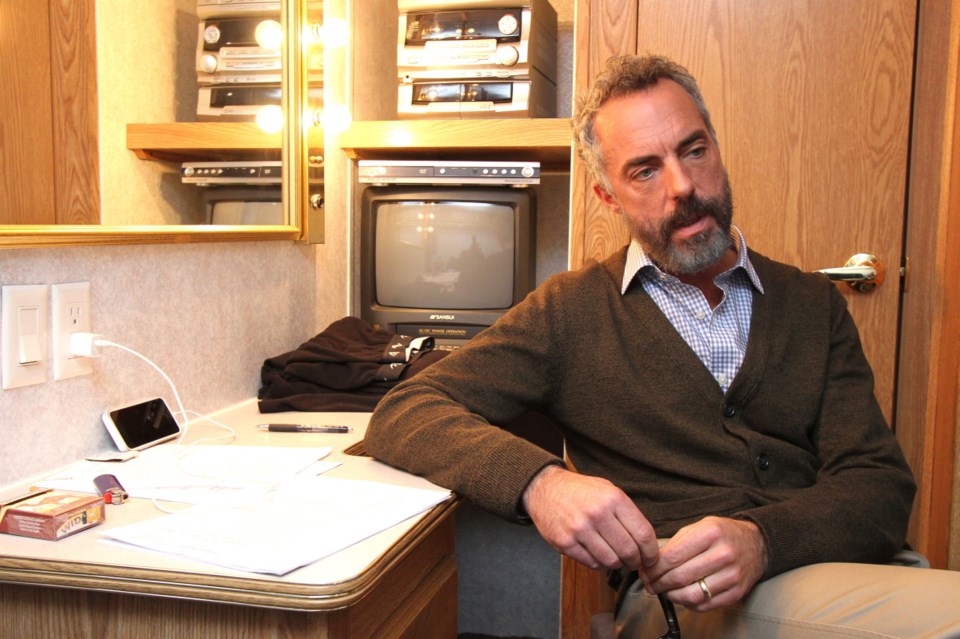When it comes to choosing movie and TV projects, Titus Welliver isn’t a “size does matter” kind of guy.
True, the prolific actor with a face more recognizable than his unusual name is in two of 2012’s big Hollywood releases. He played Jon Bates in Argo, Ben Affleck’s Iran hostage drama, and he’ll soon be seen in Gus Van Sant’s Promised Land as a rural gun and guitar-shop owner enlisted by Matt Damon’s character, a corporate salesman seeking to purchase local drilling rights.
Welliver, 51, has also amassed screen credits in movies such as The Doors, Assault on Precinct 13, Man on a Ledge and two other Affleck films — Gone Baby Gone and The Town. His TV roles include “the Man in Black” on ABC’s Lost, Silas Adams in HBO’s Deadwood, prosecutor Glenn Childs in CBS’s The Good Wife and Irish thug Jimmy O’Phelan in FX’s Sons of Anarchy.
Yet the busy Hollywood actor is just as content shooting the small-scale crime thriller Poker Night in Victoria.
Director Greg Francis’s interesting script, non-linear story structure and distinct characters unburdened by clichés was “just part of it,” Welliver says. He plays Floyd Maxwell, one of five seasoned cops who mentor a rookie (Beau Mirchoff) targeted by a serial killer. Giancarlo Esposito, Ron Perlman, Ron Eldard and Victoria-born producer Corey Large play his comrades-in-blue.
“I think it’s important, certainly when you have some clout or name value, to support smaller projects that come across your table,” says Welliver, wearing a checked shirt, a thin peacock-green cardigan, tan slacks and polished brown dress shoes in his trailer near a Prospect Lake home where the film’s stars are shooting the title sequence. “It’s very hard to get films made, so when an opportunity like this comes up, you take it. And a big budget doesn’t always necessarily mean a better movie.”
Despite a slick ad campaign and A-list cast headlined by Damon, Frances McDormand, John Krasinski and Hal Holbrook, Promised Land was made on what, by studio standards, is actually considered a smaller budget, Welliver said.
“What happens is people realize you have to mine these kinds of jobs because studios aren’t doing as many simple stories as they used to,” he said. “I feel the independent film industry, for lack of a better word, really needs to be nurtured.”
No matter what he does, Welliver loves to provide creative input. When asked about the beard he has sprouted, he says “it was a choice I made” for his Poker Night character. “And I just felt like having a beard,” he adds, laughing.
He also contributed creatively to Deadwood. When creator David Milch was naming his character, the smart but lethal “bagman from Yangton,” Welliver suggested he be named Silas after his brother, who died two years earlier.
“It brought me back to my childhood,” he recalled. “It was a great way to pay tribute to my brother, who I love dearly.”
The conversation returns to Promised Land, “a poignant, important film” Welliver has just seen and is pleased with. Although it centres on what he terms “a really dangerous crime against nature” — the resource extraction process known as hydraulic fracturing, or hydrofracking — he said it’s really a story about people and personal growth once the truth unfolds and a grassroots campaign divides the community.
“It’s a serious issue and we’re seeing it happen more and more all over the world,” says Welliver. “Hydrofracking is not the answer to reducing our dependency on foreign oil. I think it’s an absolute travesty and people trying to sell this as a safe, viable option should be really ashamed of themselves.”
Welliver says his character in Promised Land — “a very affable, open and regular guy” — was a nice departure from playing the “hard-hitting characters” that have created the impression he’s an intense, formidable dude in person.
“It’s a common perception,” he says, laughing. “I am a knock-around guy, though. I’ve had a checkered past and my share of ridiculous behaviour, but some of my characters are very heavy-duty, intense and certainly, at times, violent.”
While he says he’s approachable and grateful for fan feedback, he admits he finds it amusing when some who stop him on the street seem hesitant at first.
“Because of some characters I play, they wonder if I’m going to be brooding and intense,” he says, admitting he does have intense moments. “My father once said to me I was the only person he knew who carried around their own weather system.”
Although Welliver has played dozens of characters, including trauma surgeons (NYPD Blue), high-powered CEOs (CSI) and space commanders (Star Trek: Voyager), the actor who once played Al Capone is the go-to guy for directors seeking villains.
“I get offered my share of roles I won’t do now because I feel you need to kind of reinvent the wheel to a certain degree and it’s very easy to get pigeonholed,” he says. “The reason I became an actor is because I love wearing all the different hats.”
It’s no coincidence Welliver has done three films with Affleck, who cast him as Lionel McCready, the mustachioed Bostonian whose four-year-old niece was abducted in Gone Baby Gone and as obsessive FBI agent Dino Campa in The Town. He loves working with Affleck and his crews so much, he couldn’t resist playing Jon Bates in Argo, even though it was a smaller role.
“For my money, pound for pound, I think Ben’s one of the finest directors out there — period,” Welliver says. “When you work with someone like Ben, you know it’s going to be the highest quality and enjoyable. You might even learn something.”



